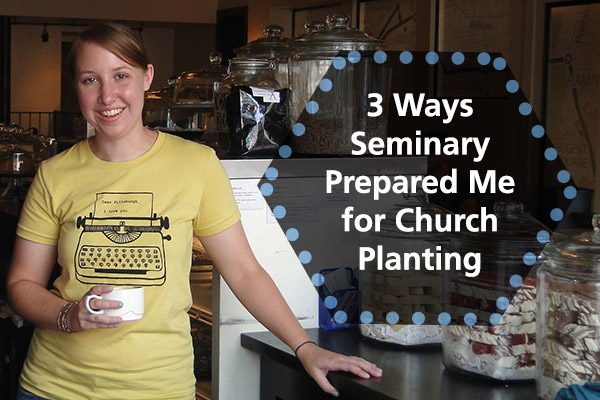Church planting is a pioneering ministry. Blazing trails. Cutting new paths. Exiting the box of institutional restraints and “the way things are done” to reach new people in new ways with the Gospel. The idealized, going-rogue vision of starting a new worshiping community lends itself to the assumption that institutional structures of the established church have little to add and a lot to get in the way.
The general sentiment at gatherings of church planters tends to be, “Institutions . . . ugh.” I often track with this. I celebrate the ways that church is being done outside the confines of large budgets, buildings, and bureaucracies. In my less than Christ-like moments, I have had little patience for time spent mourning the decline of many of those institutions.
But for those of us in pioneering ministries, theological education is a great gift. Here are three ways seminary prepared me for the work of church planting:
“You don’t make God relevant; God makes you relevant!”
On an almost weekly basis these words, spoken by one of my favorite professors my second year of seminary, still bounce around in my head. At the time, I had almost no idea what he meant. I assumed that making God relevant was part and parcel of a call to ministry. This, however, is not the work of the church— established or just beginning to gather.
God is always relevant. This whole thing—life, the universe, everything— is held together by God. We are the ones so often irrelevant because we miss what God is doing by being too busy trying to do what we’ve deemed, “the work of God.” God is on a mission to reconcile the whole world to Godself. We just need to discern the Spirit’s movement and join in. This missional theology calls us to trust God, rather than peddle God.
Context is Everything
I once wrote a paper that spent close to five pages discussing the meaning of the word, “know.” While even at the time this felt a little absurd, the skill of exegeting a text—critically interpreting by reading “out of” Scripture, rather than “into” it—has been important for me in preaching, teaching, talking over beers, and thinking theologically about the way our new worshiping community is forming. Outside of Scripture and theology, I’ve used the skills for neighborhood exegesis. To critically and prayerfully interpret anything—whether Scripture or a worship gathering or a neighborhood block—context is everything. I spent five pages on the word, “know,” because what “know” means to me sans context is very different than what it meant in Paul’s first letter to the Corinthians. In its particular letter, to a particular group, at a particular time, it has a particular meaning. My interpretation for what God might be up to here and now through the lens of that Scripture is impacted by its original context and by my current context.
In the same way, gathering a new community depends on context. The history of the place and people, the symbols, the stories—these are all important if we are to discern what God is up to here and now so we can join in.
You Are Not in This Alone
Perhaps the greatest gift of theological education has been community. This gift manifested in a couple ways for me: First, the community of my learning cohorts. I walked through seminary with classmates, who have become friends and colleagues, who challenged me, opened my eyes to new perspectives, prayed with and for me, frustrated me, and gave me hope. At Pittsburgh Theological Seminary, I was also a part of a smaller cohort of those in the Church Planting Emphasis. This group taught me the importance of communal discernment, and God used them again and again to call me into this work. Second, the community of theologians who taught me. Professors, staff, pastors I connected with as a student, and the many, many authors I read. This community brought me into a diverse and dynamic conversation—and taught me how to actually participate in it. Though I am doing “new” and “pioneering” work, I know that I am actually located within this great cloud of witnesses. And though my church doesn’t look very churchy, we are within the big, eclectic tradition of the Church. We are a part of the family.
Laura Bentley ’16 is the organizing pastor of Sanctuary Missional Fellowship, a new worshiping community in the Lawrenceville neighborhood of Pittsburgh. She earned her MDiv with an emphasis in Church Planting from Pittsburgh Theological Seminary.

